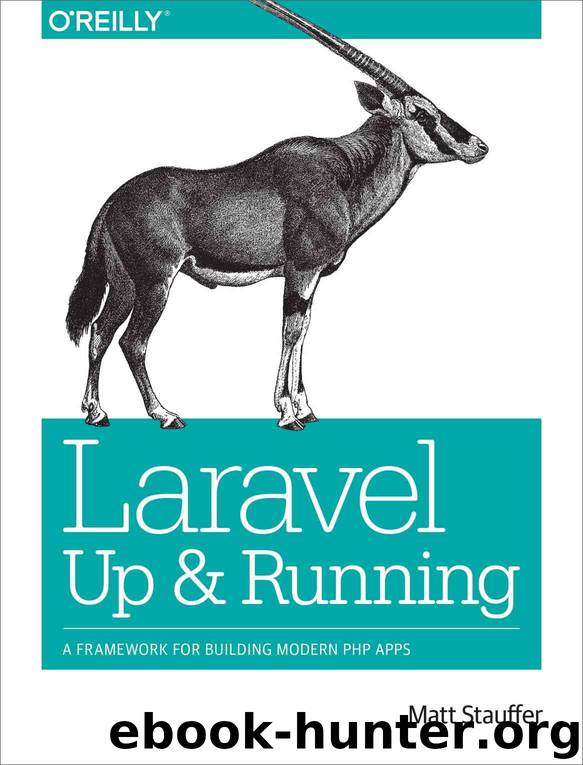Laravel: Up and Running: A Framework for Building Modern PHP Apps by Stauffer Matt

Author:Stauffer, Matt [Stauffer, Matt]
Language: eng
Format: azw3, mobi
Publisher: O'Reilly Media
Published: 2016-11-20T16:00:00+00:00
Example 10-10. Using the json() response type
public function contacts() { return response()->json(Contact::all()); } public function jsonpContacts(Request $request) { return response() ->json(Contact::all()) ->setCallback($request->input('callback')); } public function nonEloquentContacts() { return response()->json(['Tom', 'Jerry']); }
Redirect responses
Redirects aren’t commonly called on the response() helper, so they’re a bit different from the other custom response types we discussed already, but they’re still just a different sort of response. Redirects, returned from a Laravel route, send the user a redirect (often a 301) to another page or back to the previous page.
You technically can call a redirect from response(), as in return response()->redirectTo('/'). But more commonly you’ll use the redirect-specific global helpers.
There is a global redirect() function that can be used to create redirect responses, and a global back() function that is a shortcut to redirect()->back().
Just like most global helpers, the redirect() global function can either be passed parameters or can be used to get an instance of its class that you then chain method calls onto. If you don’t chain, but just pass parameters, redirect() performs the same as redirect()->to(); it takes a string and redirects to that string URL. Example 10-11 shows some examples of its use.
Download
Laravel: Up and Running: A Framework for Building Modern PHP Apps by Stauffer Matt.mobi
This site does not store any files on its server. We only index and link to content provided by other sites. Please contact the content providers to delete copyright contents if any and email us, we'll remove relevant links or contents immediately.
| Coding Theory | Localization |
| Logic | Object-Oriented Design |
| Performance Optimization | Quality Control |
| Reengineering | Robohelp |
| Software Development | Software Reuse |
| Structured Design | Testing |
| Tools | UML |
Deep Learning with Python by François Chollet(11892)
Hello! Python by Anthony Briggs(9372)
OCA Java SE 8 Programmer I Certification Guide by Mala Gupta(9343)
The Mikado Method by Ola Ellnestam Daniel Brolund(9307)
Dependency Injection in .NET by Mark Seemann(8859)
Algorithms of the Intelligent Web by Haralambos Marmanis;Dmitry Babenko(7851)
Test-Driven iOS Development with Swift 4 by Dominik Hauser(7323)
Grails in Action by Glen Smith Peter Ledbrook(7295)
The Well-Grounded Java Developer by Benjamin J. Evans Martijn Verburg(7116)
Secrets of the JavaScript Ninja by John Resig Bear Bibeault(5957)
Kotlin in Action by Dmitry Jemerov(4637)
Practical Vim (for Kathryn Amaral) by Drew Neil(3728)
Cracking the GRE Premium Edition with 6 Practice Tests, 2015 (Graduate School Test Preparation) by Princeton Review(3596)
Linux Device Driver Development Cookbook by Rodolfo Giometti(3414)
Learn Windows PowerShell in a Month of Lunches by Don Jones(3242)
Learning Java by Patrick Niemeyer & Daniel Leuck(2871)
Learning React: Functional Web Development with React and Redux by Banks Alex & Porcello Eve(2837)
Becoming a Dynamics 365 Finance and Supply Chain Solution Architect by Brent Dawson(2670)
Mastering Java 9 by Dr. Edward Lavieri(2573)
